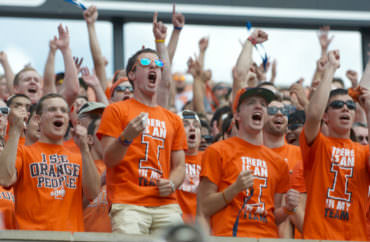
Ban championship games
Chief Illiniwek has not been the official University of Illinois at Urbana-Champaign mascot for 12 years. It also banned the “war chant” at games two years ago, in a bid to be “inclusive.”
But the chief’s legacy continues to loom large over Illini sports, and 39 current and former professors argue that this tolerance for the past is a violation of NCAA rules.
In a letter to top NCAA officials last week, they claim the university is violating “NCAA policy on the use of Native American mascots, imagery and culture in intercollegiate athletics.” It cites not only NCAA Constitution provisions on “cultural diversity and gender equity” but also “sportsmanship and ethical conduct.” (The letter does not protest the NCAA’s use of “man” in “sportsmanship.”)
UIUC is still using “racial/ethnic references in their intercollegiate athletic programs,” according to lead author Stephen Kaufman, professor emeritus of cell and developmental biology.
But much of the complaint seems to blame UIUC for not indoctrinating its constituencies on the logo’s offensiveness or cracking down on team fans for promoting the chief. Its grievances are not fully consistent with each other, either.
For example, the professors accuse the university of marketing the chief’s logo “in excess of any legal requirement to maintain logo ownership,” yet the very next grievance blames UIUC for failure to “enforce its ownership rights” to the chief-related trademarks, “allowing their widespread use.”
Contrary to the letter’s portrayal, UIUC actually sued an alum who sold shirts with the chief’s depiction and the slogan “Make Illinois Great Again” (below).
MORE: University of Illinois sues alum for ‘Make Illinois Great Again’ shirts

Kaufman and his colleagues, including Osage Nation member Robert Warrior, claim that UIUC is still using “Illini” and “Fighting Illini” as references to Native Americans.
It’s not obvious from university history that the name was originally intended to allude to the tribe, however. University archives claim that the first written use of the term it could find was 1874, when the student newspaper changed its name from The Student to The Illini.
“Fighting Illini” was adopted to promote the construction of Memorial Stadium, and it was “seemingly” connected to the community’s military service in the First World War.
UIUC does acknowledge that the period in which the nickname was adopted “coincided with the use of Native American imagery, usually in a romantic style.”
The letter does not specify how UIUC “selectively enforces” regulations on athletic facilities for supporters of the chief. The university allows “violations by Illiniwek supporters and facilitat[es] access and efforts of those who would maintain the university’s use of Native American stereotypes, imagery and mascots.”
One specific incident that drew its ire: The Board of Trustees “severely reprimanded” the chancellor and athletic director when they put the kibosh on the war chant (below).
MORE: University of Illinois ditches war chant to be more ‘inclusive’
“Undoubtedly, this has had a chilling effect on further compliance by the university with NCAA policies governing the use of Native American mascots, imagery and culture,” the letter says. (It’s not stated whether the two officials had authority to ban the war chant without trustee approval.)
The professors also cite an NCAA policy enacted 13 years ago, a year before the chief was officially removed, that bans “institutions with hostile and abusive racial/ethnic/national origin mascots, nicknames or imagery” from hosting national championships. Therefore, the NCAA should enforce this ban on UIUC.
The NCAA declined to comment on the letter to The News-Gazette, but Chancellor Robert Jones rebuked the professors for asserting “all kinds of inaccurate information.”
None of their cited instances is a violation, he said: The NCAA allowed UIUC to keep the names “Illini” and “Fighting Illini” in the wake of the 2006 policy change, and removed its sanction after the university formally ditched the chief in 2007.
Jones noted the signatories are a tiny fraction of total faculty – about 1.4 percent, based on the university’s figures – and claimed “Fighting Illini” long predates the chief and has been “misconstrued” to refer to “native people.”
Even Kaufman, the lead author and longtime activist against the mascot, has previously acknowledged that “Fighting Illini” was originally developed to honor war veterans, the newspaper notes.
Regarding the letter’s claim that UIUC “facilitates performances” of the chief, Jones speculated that it referred to people dressing up like the chief at games. That has only happened once in the past 18 months, Jones said.
Inside Higher Ed also reported on the faculty letter but failed to post it or specify how much support it had received, a failure of editorial oversight.
Read the letter and News-Gazette coverage.
MORE: Black students say USC horse mascot promotes white supremacy
MORE: Catholic university dumps ‘troublesome’ Crusaders mascot
IMAGE: Jonathan Street/Shutterstock
Like The College Fix on Facebook / Follow us on Twitter





Please join the conversation about our stories on Facebook, Twitter, Instagram, Reddit, MeWe, Rumble, Gab, Minds and Gettr.